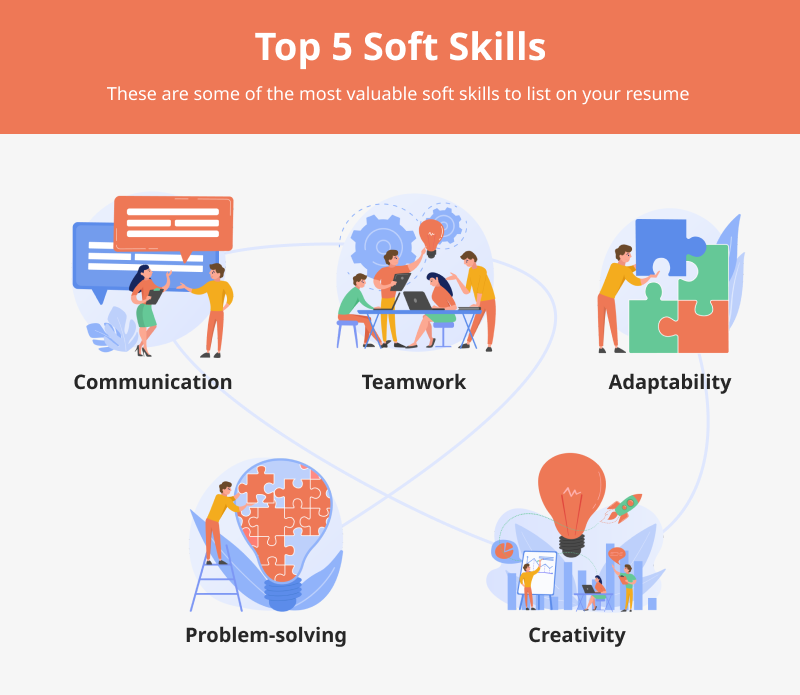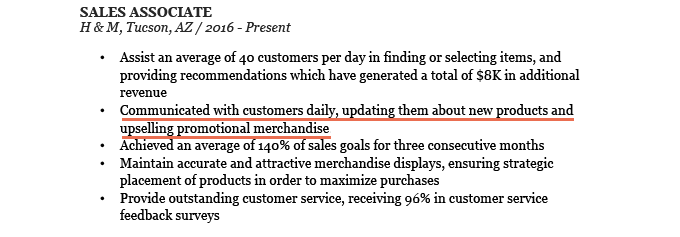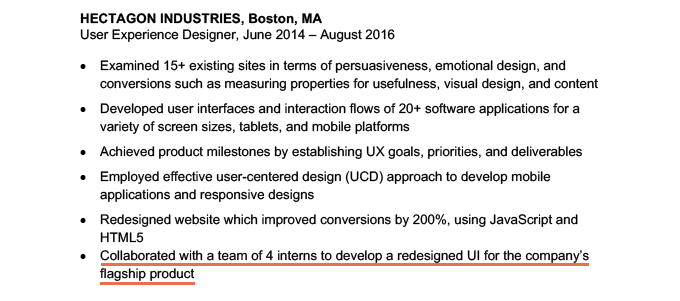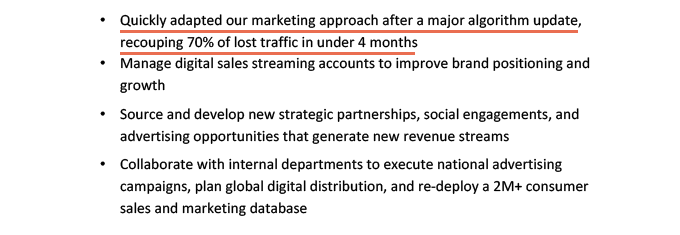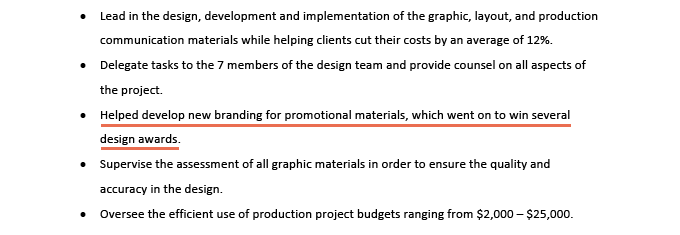Knowing which soft skills to highlight in your resume could set you apart from candidates with similar sets of hard skills. Your education, degree, and certifications might help you get an interview, but your soft skills are what will help land you the job.
[the_ad_placement id=”adsense-in-feed”]
Here are some of the top soft skills to highlight on your resume:
What Are Soft Skills?
Soft skills are character traits (like being self-motivated, creative, or reliable) that positively affect how you work and interact with others.
They are natural skills that usually can’t be taught in a classroom. Soft skills are often, but not always, “people” skills.
Soft skills aren’t always the type of skills that can be listed in the skills section of your resume. Instead, you should demonstrate your soft skills with specific examples in your work experience section.
The Difference Between Hard Skills vs Soft Skills
Soft skills relate to your emotional intelligence and natural ability to interact well with others. They are useful across all industries and job types. Hard skills are technical skills or other job-specific expertise that are learned through education or training.
Here are some of the basic differences between hard skills and soft skills:
| Key Traits of Soft Skills | Key Traits of Hard Skills |
|---|---|
| Useful across all industries | Industry specific |
| Natural abilities | Learned through training |
| Related to emotional intelligence | Based on technical knowledge |
Top 10 Soft Skills List & Examples
Employers across every industry are looking for candidates with a strong set of soft skills. Although you can’t sit down in a classroom and learn them, you can still hone and develop these talents. And as with any skill, practice makes perfect.
While you’re putting together your job application, consider emphasizing these 10 in-demand soft skills throughout your resume.
1. Communication
Communication skills are the effective oral or written ways you express yourself in the workplace. Communication is a critical sales skill, and is useful across a variety of industries — from human resources to management.
Some examples of communication skills include:
- Presentation skills
- Confidence
- Mutual respect
- Empathy
- Active listening
- Verbal communication
- Non-verbal communication
- Written communication
- Constructive feedback
- Friendliness
Here’s an example of how to effectively convey communication skills in the experience section of your resume (the example is underlined in orange):
2. Teamwork
Employers are always looking for candidates that are great at collaborating with a team. Teamwork skills help you operate well in a group and quickly and effectively accomplish tasks. In fact, teamwork is crucial for careers in market research, event coordination, and software engineering.
Some examples of teamwork-related skills include:
- Conflict management
- Delegation
- Listening
- Active listening
- Collaboration
- Cooperation
- Coordination
- Idea exchange
- Mediation
- Negotiating
Here’s an example of how to highlight teamwork skills on a resume:
3. Adaptability
Adaptability and flexibility are essential skills for embracing and adjusting to change (like what we faced in 2020, and are currently facing in 2021). These soft skills are particularly important when working in fast-paced or constantly evolving work environments such as public relations, event management, tech, nursing, and advertising.
Some examples of adaptability-related skills include:
- Curiosity
- Self-management
- Decision-making
- Calmness
- Optimism
- Open-mindedness
- Analysis
- Self-confidence
- Organization
- Self-motivation
Here’s an example of how to highlight adaptability in your resume:
4. Problem-Solving
Problem-solving skills depend on your ability to use analytical and creative thinking to find solutions. No matter what industry you work in, problem-solving skills will always be valuable on some level because every job has issues that need to be tackled. Ultimately, candidates who can tackle problems and find intuitive solutions will always be in high demand.
Careers where problem-solving is the most vital include law enforcement, information technology, and medical-related fields.
Types of problem-solving skills include:
- Analysis
- Lateral thinking
- Logical reasoning
- Initiative
- Persistence
- Observation
- Persuasion
- Negotiation
- Brainstorming
- Decision making
Here’s an example of how to emphasize your problem-solving skills on your resume with a bullet point in your experience section:
5. Creativity
Creativity is a broad soft skill that can range from helping you develop innovative solutions to being an effective graphic designer. In fact, creativity is considered by some experts to be the most important soft skill of the future.
While creativity is valuable for any industry, it’s especially important for instructional designers, architects, and artists.
Types of creative skills include:
- Divergent thinking
- Inspiration
- Imagination
- Reframing
- Mind mapping
- Insight
- Innovation
- Experimenting
- Questioning
- Design
Here’s an example of how to highlight your creativity in the experience section of your resume:
6. Work Ethic
The foundation for any great employee, work ethic is one of the most basic, widely transferable soft skills there is. By showcasing your work ethic, you communicate to employers that you believe in the importance of work and the value of putting forward your best effort.
[the_ad_placement id=”adsense-in-feed”]
Demonstrating work ethic should be important in every career, but is vital for high-stress jobs like first responders, teachers, and nurses.
Soft skills examples related to work ethic include:
- Integrity
- Responsibility
- Discipline
- Initiative
- Dependability
- Commitment
- Self-motivated
- Professionalism
- Teamwork
- Time-management
Here’s an example of how to showcase your work ethic on your resume with a bullet point:
7. Interpersonal Skills
Interpersonal skills refer to your ability to communicate well and interact with others, maintain relationships, and otherwise leave a positive impression on people.
Interpersonal skills are used every day in most industries as you interact and communicate with co-workers and management. However, they’re especially vital for people who work in industries like customer service, realty, or financial planning.
Examples of skills related to interpersonal skills include:
- Empathy
- Humor
- Mentoring
- Networking
- Sensitivity
- Patience
- Tolerance
- Public speaking
- Positive reinforcement
- Diplomacy
Here’s an example of how to highlight your interpersonal skills in the experience section of your resume:
8. Time Management
Time management skills describe your ability to work efficiently and productively by using your time wisely. Most employers appreciate this soft skill, but it’s particularly important if you’re a project manager, middle manager, or work in loss prevention or legal fields.
Some skills related to time management skills include:
- Goal setting
- Prioritizing
- Self-starter
- Planning
- Decision making
- Focus
- Delegation
- Stress management
- Coping
- Organization
Here’s an example of an experience bullet point that highlights the candidate’s time management skills:
9. Leadership
Leadership skills refer to your ability to mentor others, train new hires, and guide teams. Strong leadership skills are also one of the most essential qualities when it comes to taking on more responsibility and being promoted within a company. Employers are always looking for reliable candidates with strong leadership skills to help them grow their companies.
Leadership skills are critical for entrepreneurs, all types of management, and even careers in teaching.
Some other skills connected to leadership include:
- Project management
- Empathy
- Selflessness
- Listening
- Humility
- Management skills
- Cultural intelligence
- Authenticity
- Versatility
- Generosity
- Trust
- Mentorship
- Hiring
Here’s a resume bullet point that demonstrates how to highlight your leadership skills:
10. Attention to Detail
Attention to detail refers to your ability to be thorough and accurate in your work, and notice even minor issues when they arise. Careers suited to detail-oriented people include accounting, pharmacology, and engineering.
Some additional soft skills related to attention to detail are:
- Critical observation
- Listening
- Organization
- Scheduling
- Analysis
- Introspection
- Memory
- Acuity
- Recall
- Questioning
Here’s an example demonstrating how to showcase attention to detail through your resume experience section:
How to List Soft Skills on a Resume
Employers are always looking for candidates with a strong set of soft skills. However, you need to know how to highlight your skills properly if you want to impress them.
There are two main places on your resume that you can showcase your soft skills:
In Your Skills Section
The skills section of your resume is the most straightforward place to list your professional abilities. If there are specific soft skills that are highly relevant to the position, include them here in addition to providing examples of them in your work experience section.
Any skills included in your skills section should be listed out in simple bulleted form, like this:
However, your skills section is ultimately not the best place to highlight your soft skills. Soft skills are difficult to quantify, and should be backed up with examples, making them more suitable to touch upon in your work experience bullet points.
Instead, prioritize listing your relevant hard skills in your skills section, and including soft skills here only when highly relevant.
In Your Experience Section
The other place you should highlight your soft skills is in the experience section of your resume.
This is ideal for showing off your soft skills, because experience bullet points allow you to go into detail about how your soft skills helped you achieve things at work and deliver results.
For instance, here’s a resume work experience section that highlights soft skills throughout:
Note that within five short bullet points, this candidate is able to highlight a variety of soft skills, including leadership, organizational skills, interpersonal skills, and problem-solving.
The Importance of Soft Skills
According to Forbes, 94% of recruiters believe great soft skills outweigh experience when it comes to internal promotion to leadership positions. Simply put, they’re fundamental to getting the job you want and essential for future career growth.
As Susan Vitale of iCIMS says, “hard skills might get your resume looked at” but soft skills “help you stand out and get you hired.” You must still possess the requisite technical skills to get the job you want, but without soft skills, you can’t compete.
The post Soft Skills appeared first on Resume Genius.
[the_ad_placement id=”adsense-in-feed”]

